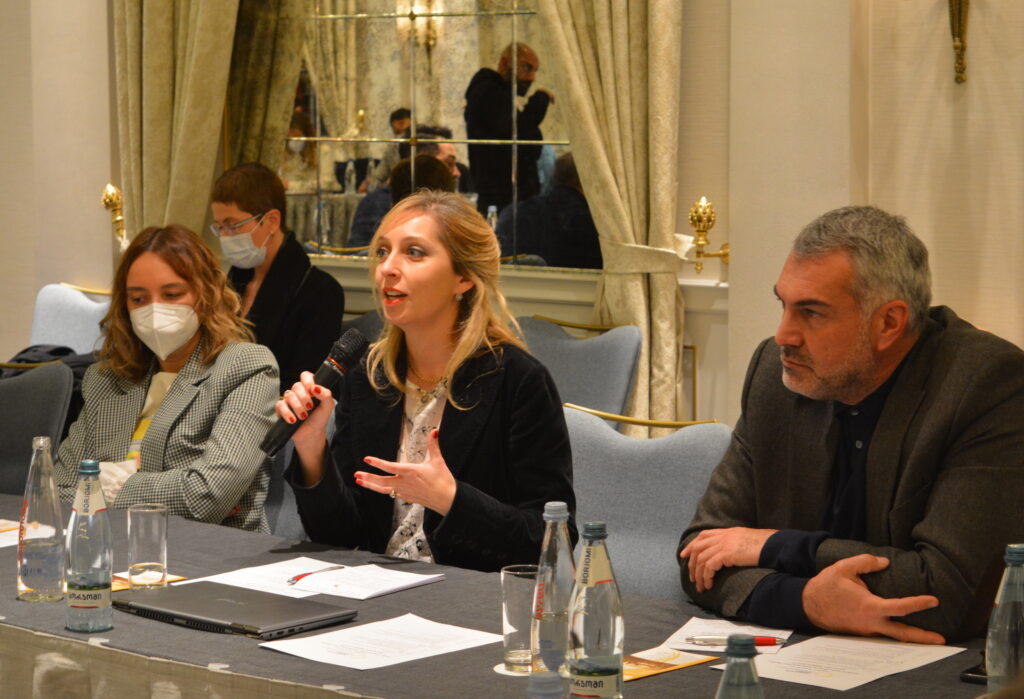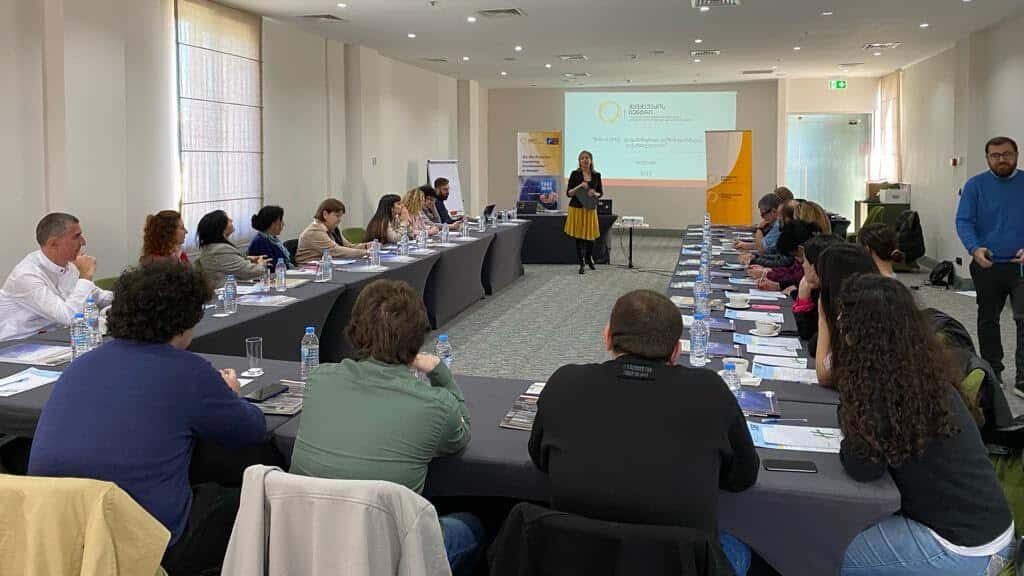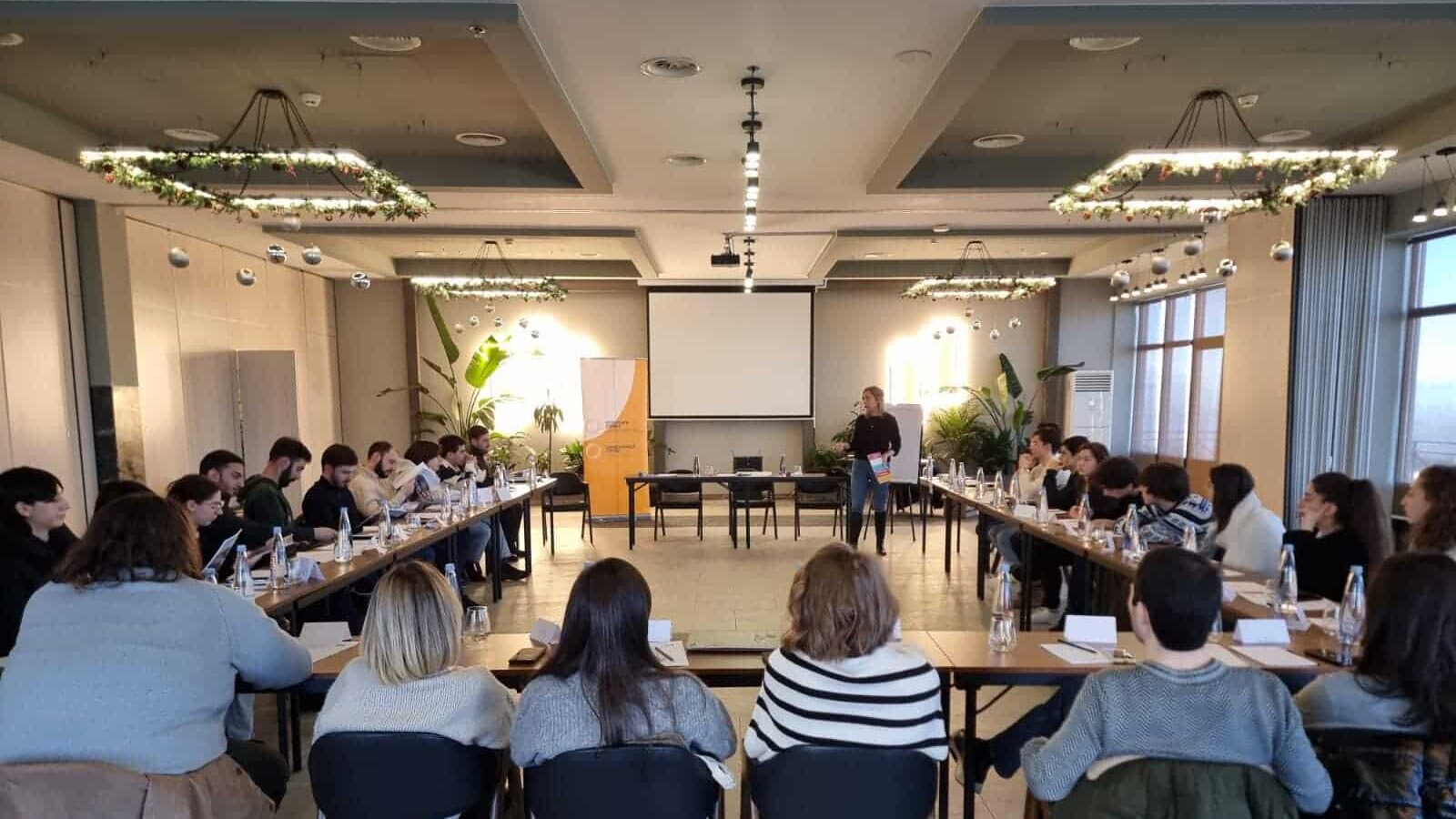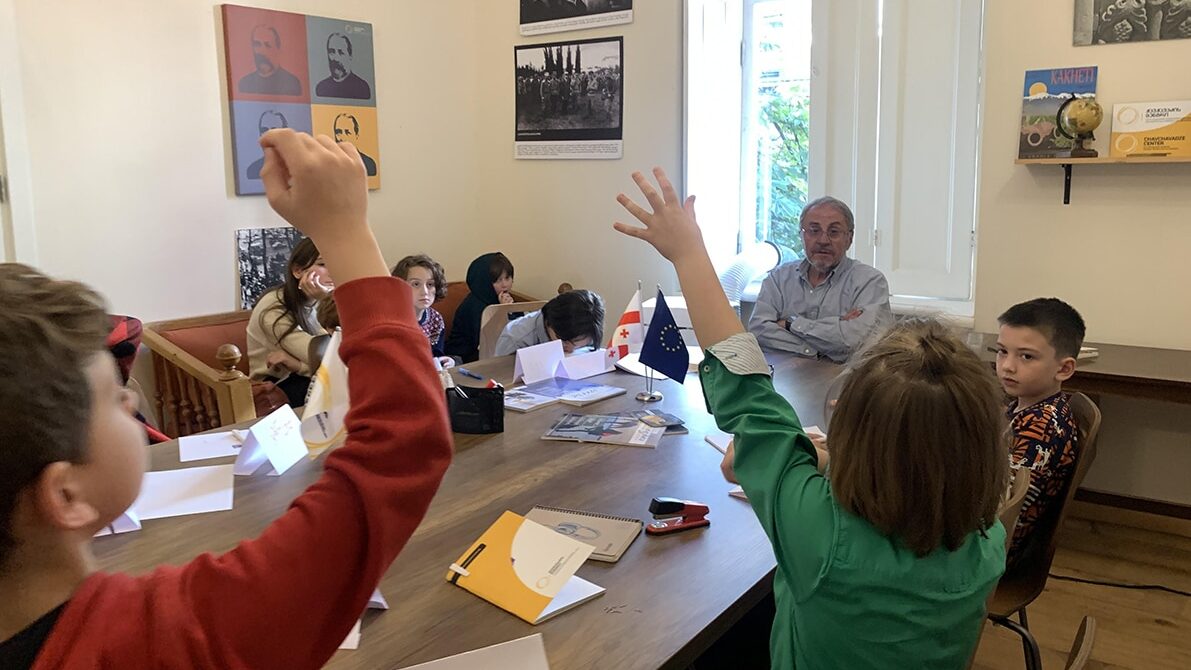Spotlight on The Ilia Chavchavadze Center: A European Political Foundation in Georgia

How one organisation is advancing democratic resilience and civic education in a complex geopolitical environment
Georgia, September 2025
In this edition of our ENoP Members Spotlight, we speak with Nino Kalandadze, Co-founder and Executive Director of the Ilia Chavchavadze Center for European Studies and Civic Education — the first civil society organisation in Georgia structured as a European-style political foundation.
From remote communities to political parties, the Chavchavadze Center works across Georgian society to promote democratic values, counter disinformation, and support the country’s European integration. As political pressures grow and civic space shrinks, the Center remains a crucial voice for rational political dialogue, youth engagement and long-term democratic transformation.
In our conversation, Nino shares insights on the Center’s mission, the challenges of working in a politically fragile context, and the importance of building democratic culture from the ground up.
At a time when democracy is under increasing pressure — not only in Georgia, but across Europe and beyond — the work of political foundations like the Chavchavadze Center is more vital than ever. As an active member of the ENoP network, the Center brings valuable perspectives from the EU’s eastern neighbourhood and serves as a reminder that supporting democracy requires long-term commitment, local expertise, and unwavering resilience.
What’s the story behind your organisation – why was it needed, and how has it evolved?
The Ilia Chavchavadze Center for European Studies and Civic Education is the first civil society organisation in Georgia established and operating as a European-style political foundation. Our mission is to help Georgian society break free from the legacy of the Soviet past and evolve into a truly European society — one that is soon ready to become a full-fledged member of the European Union.
We pursue this mission through informal education and public engagement, working across all segments of society to promote the emergence of a modern, informed and rational political class, alongside responsible citizens and a vibrant civil society. The Center is governed by a six-member Board of Trustees and a team of nine full-time staff, and our work is rooted in advancing Euro-Atlantic principles and democratic values.
As co-founder and Executive Director, I lead this dynamic think tank and focus on strengthening our institutional development to ensure that the organisation can remain sustainable well beyond the direct involvement of its founders.

In a political landscape like Georgia’s, what gap does your organisation fill – and why does that matter today?
Our uniqueness lies in both form and focus. We are the only political foundation operating in Georgia, and our work is strongly oriented toward communities that have limited access to the outside world and to Western culture. These groups often lack understanding of the values that Europe represents, and we strive to bridge that gap.
We devote equal attention to political parties, the media, and youth engagement. Our analytical and educational projects are designed to reach people of all ages — from school pupils and university students to schoolteachers themselves. Notably, we have also been pioneers in promoting intra-party democracy — the first and only organisation in Georgia to place this issue at the centre of our agenda and achieve tangible results.

Can you tell us about a project that really captures your approach?
One of the projects I’m most proud of is also one of our earliest: “Civil Society vis-à-vis Politics.” Through this initiative, our team — alongside well-known figures from various fields — visited nine regions of Georgia, including remote areas and communities with ethnic minorities. We conducted public lectures and masterclasses with more than 300 participants. Many of them are now successful students, professionals, and active citizens, playing an important role in defending Georgia’s democracy and Euro-Atlantic aspirations today.

What’s the toughest part of your work right now – and how are you staying resilient?
Since the full-scale invasion of Ukraine, Georgia’s democratic trajectory and its EU integration process are under serious threat — as is the country’s independent civil society, which stands as a barrier to authoritarian influence. The environment for NGOs has deteriorated rapidly. Our staff have faced physical attacks, arbitrary arrests, and intimidation campaigns. Some have even been labelled as “agents of foreign influence.”
We are no longer able to operate freely or safely.
Despite this, we remain committed to our mission. We’ve adapted our operations and accelerated our digital transition, creating alternative platforms and safe spaces for rational, evidence-based political discourse to support civil society in withstanding both internal and external pressures.
Is there an insight or strategy you’ve developed that others working in democracy support could learn from?
One key lesson from our experience is that countering disinformation goes far beyond fact-checking. In Georgia, Russian propaganda exploits the remnants of the Soviet legacy, leaving many communities vulnerable. The country is often used as a testing ground for hybrid tactics that are later exported to other regions, including Western democracies.
We’ve learned that the most effective response lies in developing alternative narratives — ones that resonate emotionally and are grounded in civic memory and historical understanding. Inspired by the Finnish model, we prioritise civic education and identity-building, particularly among young people. Creative storytelling, paired with rational analysis, has proven far more effective than merely debunking false claims.
Another broader lesson is that for international organisations to work effectively in politically sensitive environments, they must be both operationally flexible and deeply aware of national and historical contexts, while staying rooted in core democratic values.

When you say “supporting democracy,” what does that look like on the ground?
Supporting democracy means fostering critical thinking, building civic memory, and equipping citizens with the tools to navigate complex political realities. In Georgia, that translates into promoting intra-party democracy, countering disinformation through civic education, and creating platforms for meaningful dialogue beyond the polarisation of mainstream debates.
What’s one thing people often misunderstand about Georgia – or about building democracy in post-Soviet societies?
I wish more people understood that democracy-building in post-Soviet contexts is a long-term process. It’s not just about elections or formal structures — it’s about transforming civic culture, promoting critical thinking, and fostering a sense of societal responsibility.
In a country like Georgia — geopolitically fragile, with little experience of independence and a long legacy of authoritarian rule — creating an irreversible democratic culture requires patience, persistence, and a deep investment in education and identity.
About Nino Kalandadze
Nino Kalandadze is the Co-founder and Executive Director of the Ilia Chavchavadze Center for European Studies and Civic Education in Georgia. She previously served as Deputy Minister of Foreign Affairs (2008–2012) and Member of Parliament, and held several high-level positions in government and diplomacy. With a background in law and international relations, Nino is a former advisor to the President of Georgia, a trained legal expert, and an experienced academic. Her work focuses on democratic development, intra-party democracy, and countering anti-Western disinformation in the Black Sea and Caspian regions.